Zagreb Gay Pride 2021 Analysis: Issues Still Exist, Pride Celebrates History and Present Equality
July 5, 2021 - Gay rights in Croatia still have challenges ahead, but even if all problems are resolved, Pride should remain a commemorative event. A look at the history of gay culture in Croatia and the current climate in this Zagreb Gay Pride 2021 Analysis by TCN reporter Ivor Kruljac.
Zagreb Pride is the oldest pride in Croatia. First held in 2002, it attracts more and more people every year, from LGBTQ members, straight people that support gay rights to NGOs, human rights activists, and even politicians from the left and liberal specter. Over the years, the event grew from a one-day pride to Pride month, full of educational and entertaining events regarding LGBTQ issues and a chance for people with the same preferences to meet and celebrate who they are.
Pride month is marked in June in honor of the 1969 Stonewall Uprising in Manhattan.
„The Stonewall Riots, also called the Stonewall Uprising, began in the early hours of June 28, 1969, when New York City police raided the Stonewall Inn, a gay club located in Greenwich Village in New York City. The raid sparked a riot among bar patrons and neighborhood residents as police roughly hauled employees and patrons out of the bar, leading to six days of protests and violent clashes with law enforcement outside the bar on Christopher Street, in neighboring streets, and in nearby Christopher Park. The Stonewall Riots served as a catalyst for the gay rights movement in the United States and around the world“, reminds History.com.
When it comes to LGBTQ in Croatia, as you can expect with the ideological divide Croatians generally experience, there are mixed feelings on the issue.
From street violence to a family event
Participating in the first Pride in 2002 required that if you are a man loving a man ready to openly admit it, you had to have balls.
The attacks by skinheads and other „morally concerned citizens were fierce and violent. Participants truly needed police protection which was provided but also needed to be careful to not get hit by the incoming rocks that were thrown among the participants.
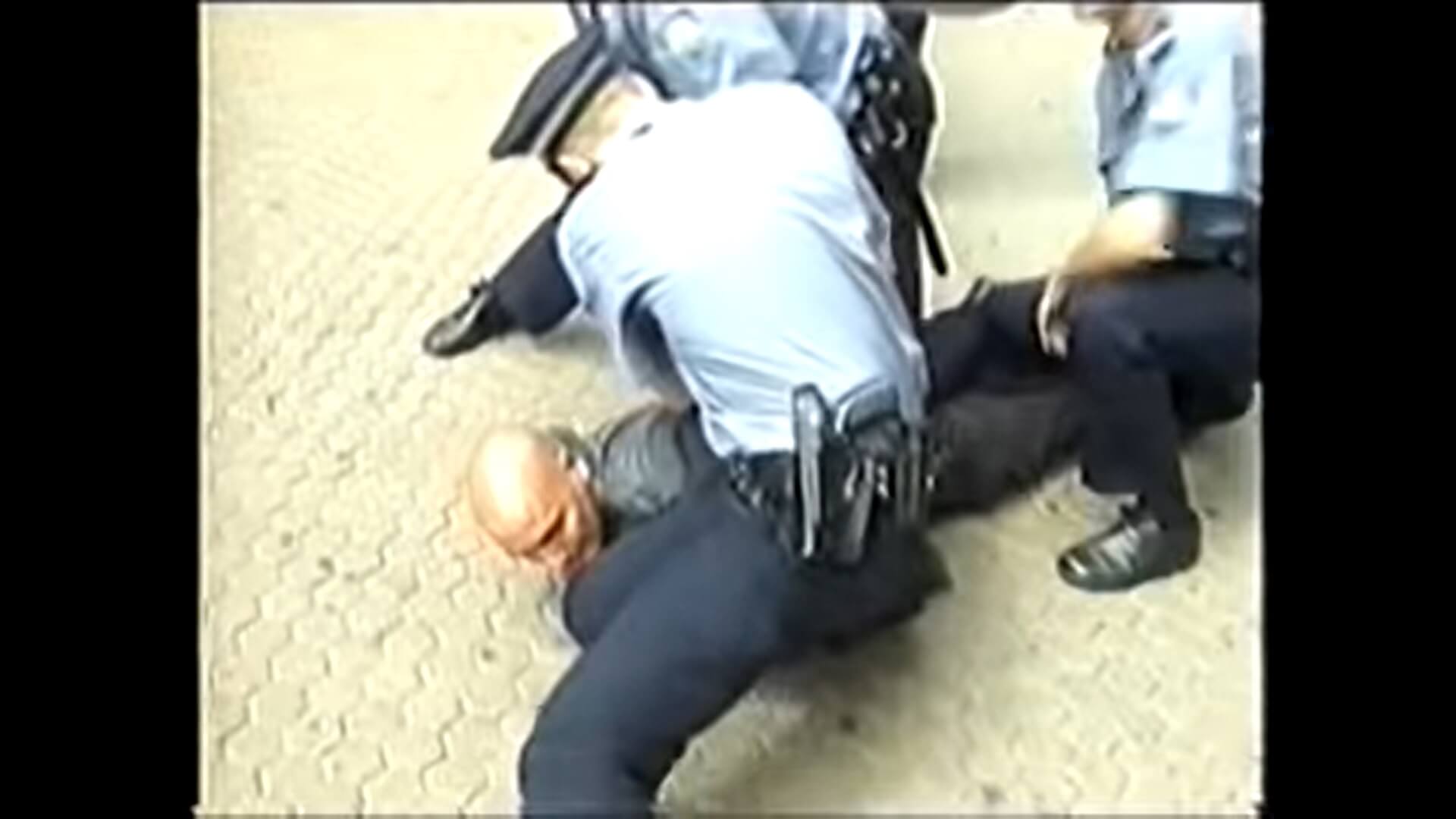
Police arresting violent skinhead at the first Zagreb Pride in 2002, screenshot / Zagreb pride
But, at least for Zagreb, the situation got better and more open. Today, pride is the forthcoming celebration of love and freedom, and entire families can be seen to join the picnic at Ribnjak park to teach their children tolerance and that people are not sick or different from others because of their sexual preference. Other larger cities in Croatia, such as Split, slowly but surely, do follow that path too, and Rijeka, the pinnacle of liberal Croatia, is also a very gay-friendly city.
Of course, a political counterstrike is expected and quite strong. The first most notable one was the 2013 referendum, where it was voted that the Croatian constitution declares marriage as a „community between a man and woman“. The goal was to deny LGBTQ couples the same rights as enjoyed by straight people.
However, the bill on life partnership outplayed that attempt.
In the meantime, LGBTQ couples can also adopt children in Croatia, as Constitutional Court concluded that gay couples fostering children is not against the Croatian Constitution.
That decision and along with the general openness of Croatia towards LGBTQ was followed by a controversial carnival in Imotski where an effigy of a gay couple was burned. President Zoran Milanović demanded an apology from the organizers, and SDP's MP Arsen Bauk filed charges against the organizers.
Counting pluses and minuses, the report on Croatia being the 39th best country for LGBTQ visitors still seems to uphold. No changes for the better, but at least Croatia is still in the top third for this category of tourists.
Haters strike back
2020 and 2021 sadly saw the uprise of violence towards LGBTQ in the Croatian capital. Apart from the occasional tearing down or burning of the rainbow flag, Croatia was shocked with an attempt of burning a man in Maksimir Forest Park as well, with his sexual preference being the sole motive for the attack.
On the other side, this year's pride felt to start stronger than ever. The newly elected mayor Tomislav Tomašević joined the parade, along with stating that Zagreb is a city that is open to everyone. This year arranged a bit differently to adhere to corona measures; around 2500 participated in the event.
„Twenty of our prides made our city and our republic a better, more democratic, and joyous place for the life of all citizens“, was the main message of the 20th edition of Zagreb Pride.
As reported by Index.hr, the Zagreb Pride association representatives stated that the Croatian LGBTIQ community „became a powerful, responsible and self-aware part of the country, but that the fight isn't over“.
„Our constitution and our laws still do not include in a complete and fair way. Our streets and squares are still not free of hate. We didn't forget nor we will forget victims of homophobic and fascist rampage in this year and all previous years“, stated Zagreb Pride.
Sadly, while Pride itself went without issues, participants of the pride who walked the streets of Zagreb after pride with rainbow flags faced a series of physical attacks on several locations in Zagreb.
A week ahead of Pride, conservative MOST Party parliament member Nikola Grmoja complained that commercials displayed during EURO 2020 commercials were LGBTQ propaganda and that kids need to be protected from it and announced that he might include it in his anti-pedophile package. Grmoja's statement caused strong disagreements among the Croatian public, with several people (including celebrities) teasing him that if he wants to start battling pedophilia, he should start from church (as Grmoja is quite clerical). Božo Petrov, president of the MOST party, added more fuel to the fire when he supported Grmoja, stating that „minorities can't dictate what my children can learn in school“. He added that minorities need to be aware that they are minorities and that „we tolerate that," sparking more enrage from the public, with many comparing MOST to the controversial Hungarian Prime Minister Viktor Orban.
Zagreb Pride linked the post-Pride physical attacks with Petrov and Grmoja's public statements, and Petrov and Grmoja announced they would sue Zagreb Pride for slender.
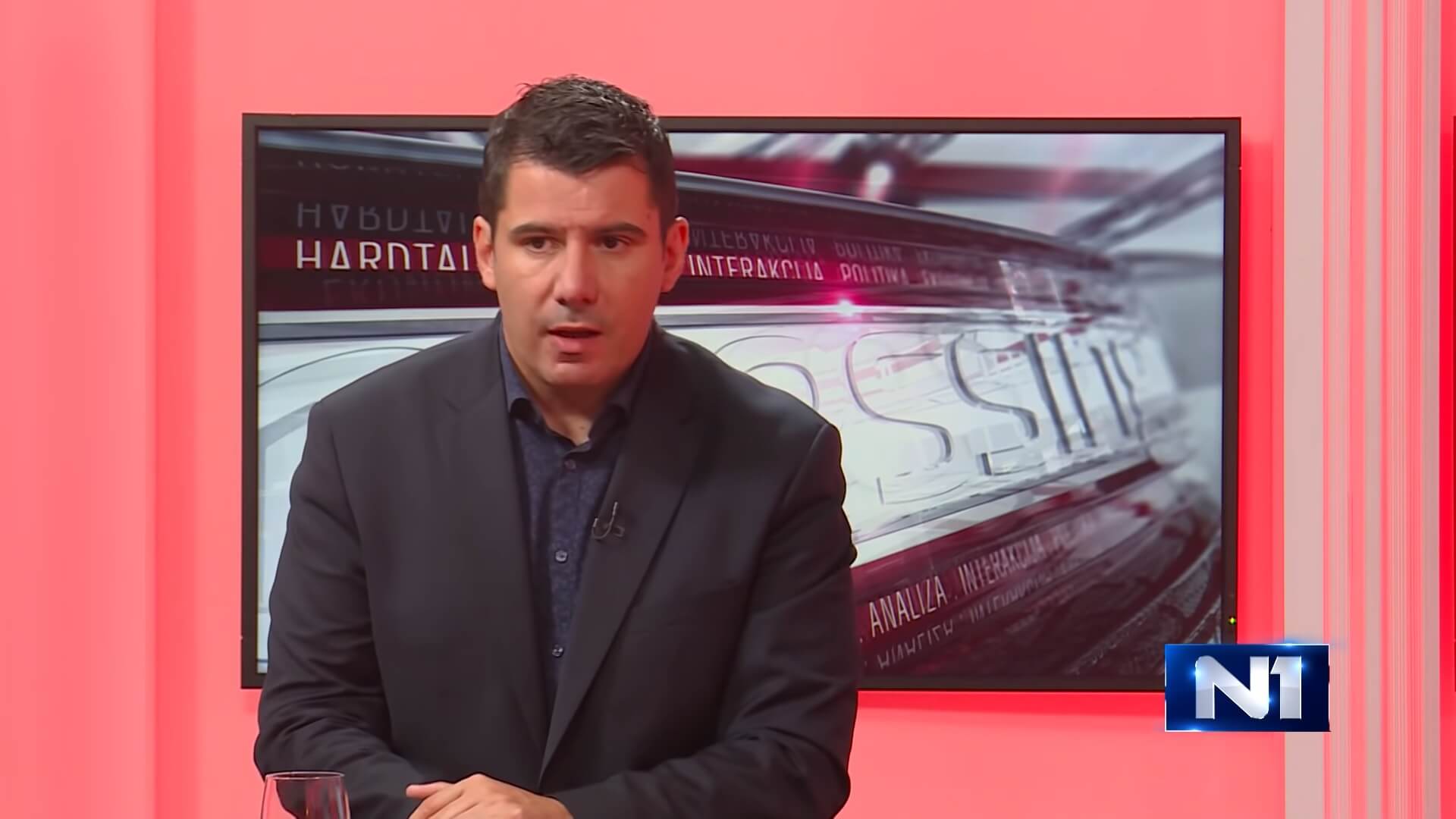
Nikola Grmoja, screenshot N1
The Law: "Gay is OK". Popular opinion: "Do it in your homes, not on the streets".
In this political escalation, what does the average Croatian think? Looking at the comments on social networks, it seems the majority of Croatians don't mind gays being gays and living how they like (even if they are not always happy with legal rights the LGBTQ community received). But, one sentiment in that „tolerance“ is particularly worrying.
„Live in your house however you want it. You don't have to wave around, like its a best thing ever“, said one of the online comments on Index.hr beneath the news on Petrov and Grmoja.
So it seems the public does not understand why Pride is important. First of all, as evident, the political climate is such that the battle for equality truly isn't over in Croatia, and Pride is the best way for the community to express what issues LGBTQ still face in Croatia. Additionally, pride month is also educational and supportive, and public presence show to other people who feel the same that they are not alone, as they might feel lonely and unable to find people who feel the same in everyday life.
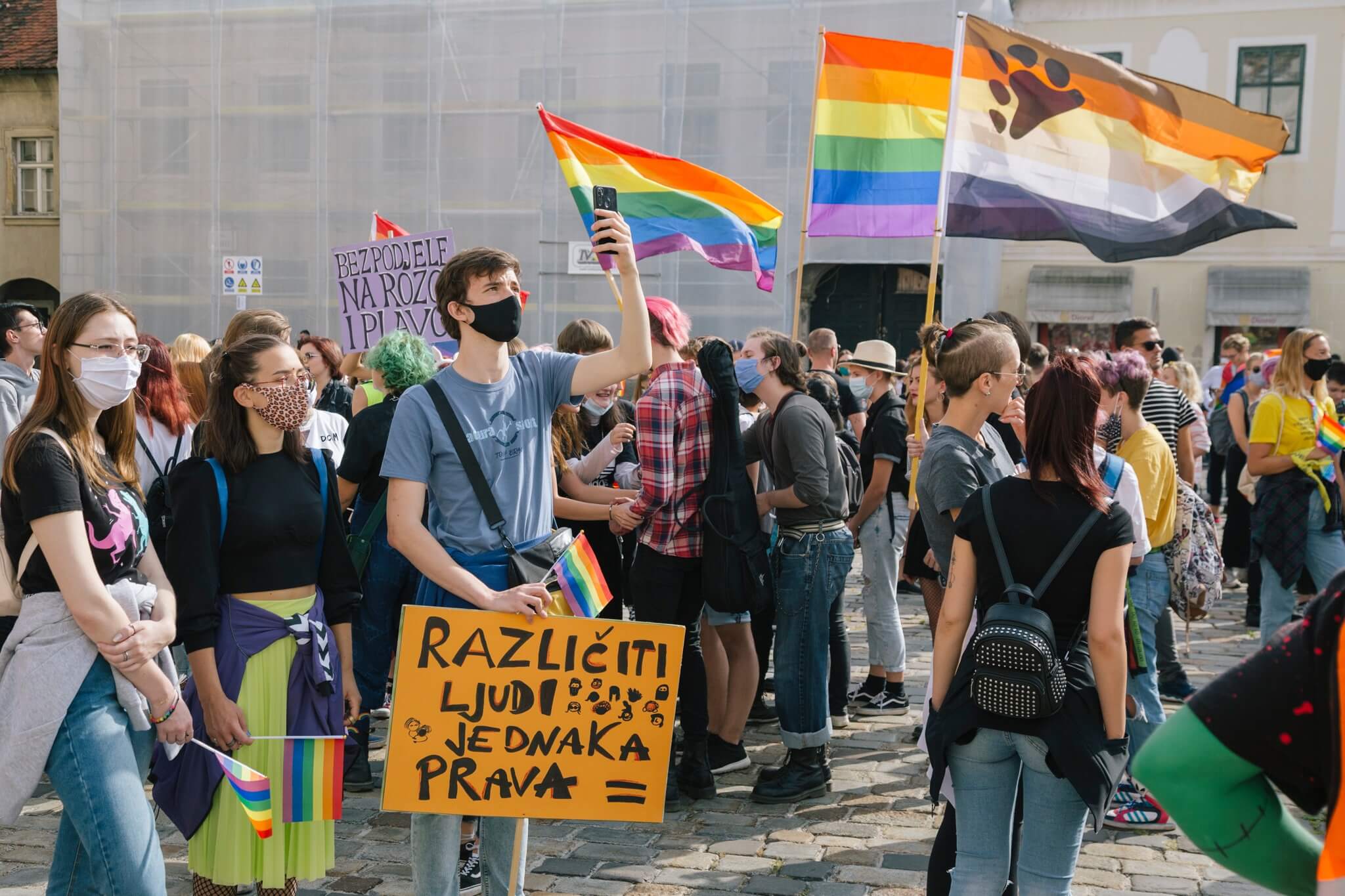
© Zagreb Pride
But, even if the law and constitution give the same rights and solves the problem of intolerance of LGBTQ people completely, does that mean that Pride should then be canceled? Well, Croatia won its independence and the war in the nineties. Does that mean we should stop commemorating the Homeland War? Or is it nice to honor and celebrate the victory and triumph over all obstacles Croatia had to face in its independence? Pride is a cultural, commemorative event honoring those who were or still are victims and oppressed for their sexual preference, either in Croatia or in the world. Croatia is a democratic country. Every group, national, ethnical, racial, religious, etc. should have the right to gather and honor its heroes. The right to gather and honor its tragedies and their dates and connect with other people who feel the same. If political elites are so concerned with keeping Croatians in Croatia, then they can't afford to discriminate or attack part of Croatian society solely based on their sexual preference. A preference that, unlike being violent or intolerable, can't be chosen.
Learn more about LGBT rights in Croatia and what LGBT tourists should know on our TC page.
For more about LGBT in Croatia, follow TCN's dedicated page.
Two NGOs to File Report Over Burning of Rainbow Flag
ZAGREB, 11 May, 2021 - The Rijeka-based LORI lesbian association and the Rainbow Families association of LGBTIQ couples and individuals who have or want to have children will file a report with the local prosecutorial authorities over the burning of a rainbow flag on the City Hall building.
In the night between May 7 and 8, a video of the burning of the flag was posted on the Instagam profile "riječani.1987", which is linked with the Armada football fan group, with the message: "This is the response to the newly-adopted law on adoption by same-sex couples."
LORI and the Rainbow Families said they would file a report for incitement to violence and hate and causing damage to another's property.
The two associations said they expected a prompt reaction by the competent state institutions, with LORI recalling that in 2020 it filed a report with the Rijeka prosecutor's office over graffiti saying "Kill faggots", sprayed on a window of the Rijeka City Hall after an exhibition dedicated to the 20th anniversary of the association was staged there.
For more about LGBT in Croatia, follow TCN's dedicated page.
LGBTQ Travel Safety in Croatia: 39th Most Popular Country in the World
March 9, 2021 – When it comes to traveling, Croatia has been known as a gay-friendly destination, even though not all Croatians in every part of the country are fond of accepting gay and lesbian couples. In a recent study, LGBTQ travel safety in Croatia ranks 39th on the list of 150 world's most popular countries for LGBTQ+ travel.
The research has been conducted by Asher and Lyric Fergusson, an Australian-American married couple, who write and do the research studies on topics that help travelers to travel safely. They have now taken an in-depth look at LGBTQ+ rights, country by country, reviewed individual laws and gathered data from various trusted international sources to create the definitive "LGBTQ+ Travel Safety Index" that shows safest, as well as least safe countries for LGBTQ+ travel.
After more than 250 hours of research, they made a list of 150 most (and least) popular countries, where Croatia took 39th place. We reviewed the information brought out about Croatia and added some useful information about LGBTQ+ communities in Croatia.
Croatia in the first third of best countries for LGBTQ+ safety
In a comprehensive overview, researchers listed 150 countries from worst to best regarding travel safety for LGBTQ members. The criteria according to which they made a list consists of ten critical factors:
- Legalized same-sex marriages
- Worker protections
- Discrimination protections
- Criminalization of violence
- Adoption recognitions
- Quality of life
- Transgender legal identity laws
- Illegal same-sex relationships
- Morality laws
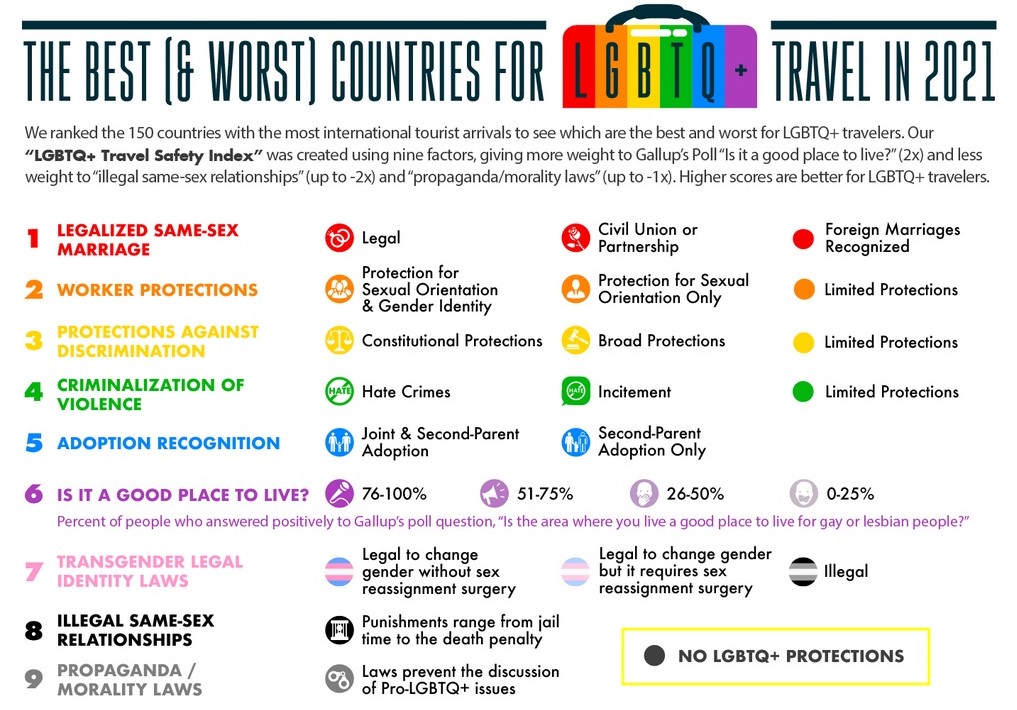
Source: Asherfergusson.com
According to the data collected by these criteria, the researchers gave Croatia an index of 188 points and a grade C+ from most safe to highest dangerous places (A to F), placing it among the first third of the best countries in the world in terms of LGBTQ+ safety.
In Croatia, the same sex-relationships are legal since 1977. However, same-sex marriage or families are not permitted, but same-sex life partnership is (i.e., civil union). The Life Partnership Act came into force back in 2014, and since then, hundreds of life partnerships have been concluded, with male life partnerships being slightly more common than female. Also, it is legal to change gender without sex reassignment surgery.
Violence against the members of the LGBTQ community is considered a hate crime in Croatia. Although this study says only sexual orientation is protected in Croatia, the truth is, both sexual orientation and gender identity are protected by numerous Croatian laws. The protections against discrimination are broad, although not constitutional. Croatian Constitution still does not include same-sex families, defining marriage only as "a life-long community of woman and man." However, one year ago, the Constitutional Court gave the right to same-sex couples in Croatia to be foster parents. Before, only single gay people could adopt children.
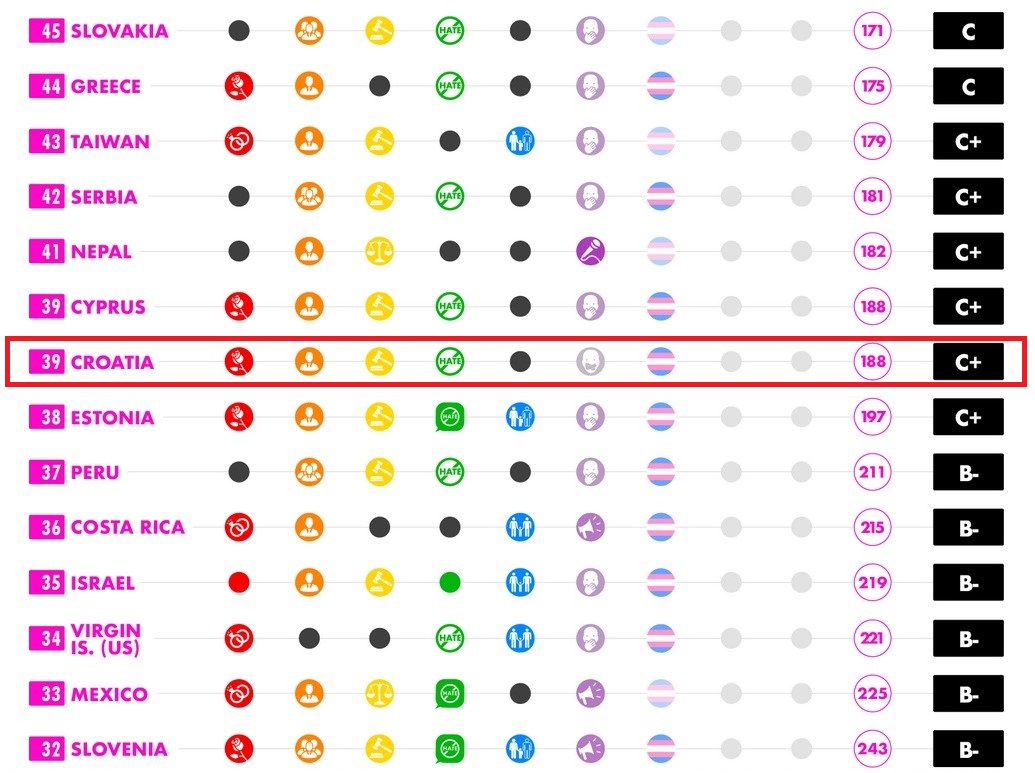
Source: Asherfergusson.com
The top ten safest countries for LGBTQ+ travel are Canada, the Netherlands, Sweden, Malta, Portugal, Belgium, the United Kingdom, Spain, Norway, and France. At the very end of the list, being the world's least safe countries for LGBTQ+ travel are Nigeria, Saudi Arabia, Malaysia, Malawi, Oman, Jamaica, Myanmar, Qatar, UAE, and Yemen.
Interestingly, the study shows that less than 25 percent of people said Croatia was a good place to live, according to Gallup's poll question's votes. These statements are arguable since one can experience life and circumstances in Croatia only by visiting it personally. Nonetheless, many places in Croatia have been gay-friendly for a long time, especially tourist destinations.
LGBTQ-friendly destinations in Croatia
Among Croatia's popular tourist destinations, Dubrovnik is considered the most LGBTQ-tolerant, while its neighboring island of Lokrum welcomes gays on nudist beaches. Of other popular Croatian coastal destinations, Split, Rovinj, Krk, Rab, Rijeka, and Hvar also welcome members of the LGBTQ community. Rab island has also become the first declared gay-friendly destination in Croatia.
Naturally, any larger town in Croatia that depends on tourism is accommodating, and gay and lesbian couples won't face discrimination. Some even go that far as to say that Croatia is one of the most tolerant countries in Europe for LGBTQ+ travelers. Meanwhile, people in smaller towns in rural parts of Croatia, due to their high traditional and religious values, tend to be very judgemental.
Last year, Croatia saw 66 new same-sex life partnerships, increasing for as many as 47 life partnerships than in 2019. Most of them were registered in Zagreb and Primorje-Gorski Kotar and Istria counties. The first gay marriage was even held in Slavonia, in Kutjevo, where such marriages are still not very well accepted among citizens, which gained a lot of interest there.
Bigger cities such as Zagreb find same-sex marriages and LGBTQ communities acceptable, as proven by the Zagreb Pride celebration of many years standing, even in pandemic-marked 2020. Still, a recent horrific hate crime perpetrated in Zagreb's Maksimir Park against a gay man, when two attackers threw a Molotov cocktail on him and caused him second-degree burns. Zagreb Pride association later condemned the attack, calling it the "worst anti-gay hate crime ever reported in Croatia." They and such associations, most of which are located in Zagreb, are trying to improve the position of LGBTQ people in the community, i.e., in Croatia.
Pride celebrations have also been organized in Croatian cities of Split and Osijek, while some other supporting celebrations occasionally happened in Rijeka and Pula as well. Also, Croatia's numerous music festivals and carnivals always welcome LGBTQ music lovers.
Although not all Croatians are tolerant, nor does Croatia have all legal protections for gay or lesbian persons, it seems like times are slowly changing for the better in creating a safe and tolerant environment for LGBTQ+ people.
For the latest travel info, bookmark our main travel info article, which is updated daily.
Read the Croatian Travel Update in your language - now available in 24 languages.
First Gay Marriage Held in Kutjevo, Heart of Slavonia
November 5, 2020 - The first gay marriage held in Kutjevo was between locals from the area of Čaglin Municipality.
As the city clocks struck midday, two men, locals from the area of Čaglin Municipality said goodbyes to their single selves and embraced their future together as husband and, well, husband. Their affirmations were heard in front of the registrar of Kutjevo and thus, officially, they became partners in a same-sex marriage. It was the first gay marriage to take place in Požega-Slavonia County.
Portal Požega.eu reported that the intimate marriage ceremony of the 47-year-old and his 32-year-old partner took place over recent days, far from the gaze of the public. The ceremony was a quiet and private affair. In rural areas like Požega-Slavonia County, such marriages are not always met with widespread approval. The city registrar reported that this was the first gay marriage they had been asked to witness, despite having been in the job for many years.
Though this may be the first gay marriage to take place in Požega-Slavonia County, hundreds of same-sex marriages have concluded in Croatia since 2014, when the Life Partnership Act came into force. In the time since then, male same-sex marriages in Croatia have been slightly more common than female ones. The largest number of such marriages took place in Zagreb. From published figures outside of Croatia, where same-sex marriages have been more commonplace over a longer period of time, same-sex marriages are frequently more stable with fewer ending in divorce compared to traditional marriages.
Life partnerships in Croatia
The first same-sex marriage in Croatia was concluded in August 2014, and despite the great interest of the public, the two male partners managed to keep the wedding a secret. Just like the couple from Kutjevo. The couple married in the first of the ceremonies in Croatia only went public with details just last year.
"I was very nervous in those days, it was a historic thing after all. If we could not have done it in Croatia, we would certainly move to a country where it was possible," one of the spouses, Ivan Zidarević, told 24sata, adding that society has changed for the better with the change in the law.
Zidarević said he believes that Croats are tolerant of gay couples. Their marriage ceremony in 2014 was witnessed by two registrars, godparents, several friends, but also the then-Minister of State Administration, Arsen Bauk, initiator of the Croatian Life Partnership Act. Bauk gave the couple a symbolic gift – a pair of ties.
According to the Law on Life Partnership of Persons of the Same-Sex, a life partnership is a family community of two same-sex persons concluded by the competent authority (a registrar). The process of concluding a life partnership in Croatia is very simple. It is necessary to report to the registrar, who then checks whether the preconditions for concluding a life partnership have been met and takes a statement on the choice of surname. After that, the time and place of the ceremony are agreed, which, along with the registrar and partners, takes place in the presence of the godparents.
Happiness despite condemnations
At the beginning of this year, the Constitutional Court decided that same-sex couples in Croatia have the right to be foster parents under the same conditions as everyone else. However, the current constitutional definition of marriage in Croatia does not include same-sex families. A change to legally recognise married same-sex partners in this way was this year demanded by the participants of Zagreb Pride, held on September 19, 2020. Pride organisers said that without a change in the recognition, state authorities are still restricting the rights of gay people and making them second class citizens.
In many EU countries, and more so in Zagreb here in Croatia, same-sex marriages are acceptable and almost every day. But, in rural areas such as Požega-Slavonia County, Kutjevo, and other places like these, such marriages are still of great interest and not universally embraced.
Although they live in an environment where they might encounter condemning views, the happy couple from Požega-Slavonia County decided to legalize their relationship. In comments on Facebook, people wished them luck, and one commenter jokingly wrote: "If they didn't make a toast with Graševina, they didn't do anything. Congratulations anyway!"
For the latest travel info, bookmark our main travel info article, which is updated daily.
Read the Croatian Travel Update in your language - now available in 24 languages
Croatia Ranks 11th for Gay Rights in Europe
ILGA -Europe, the European Region of the International Lesbian, Gay, Bisexual, Trans and Intersex Association, has published their annual review for 2017.


